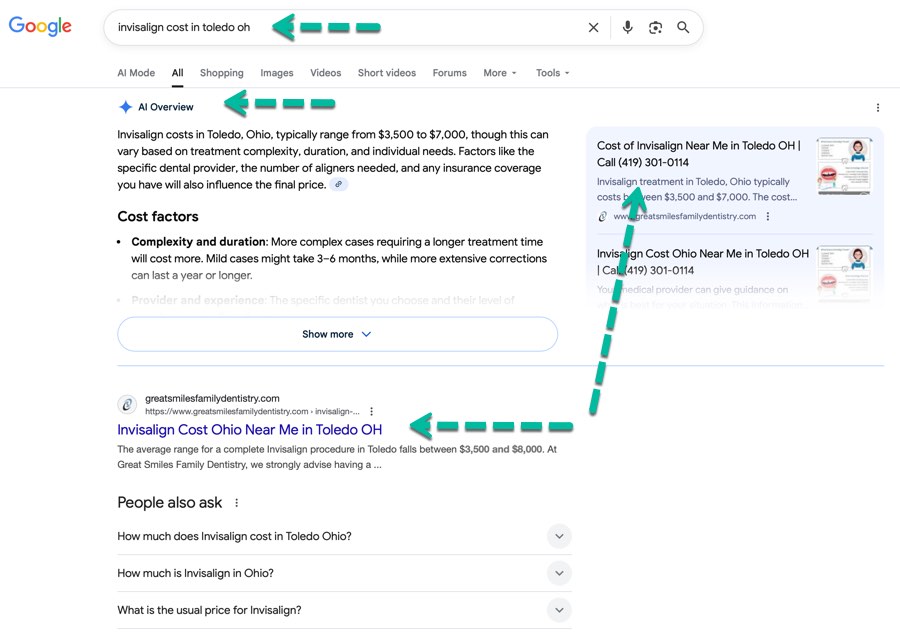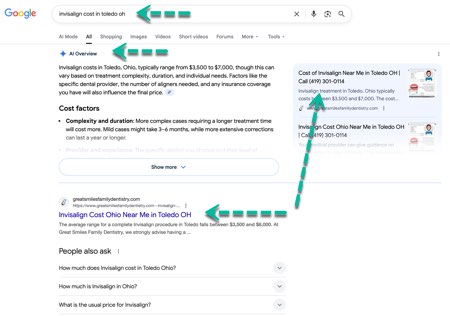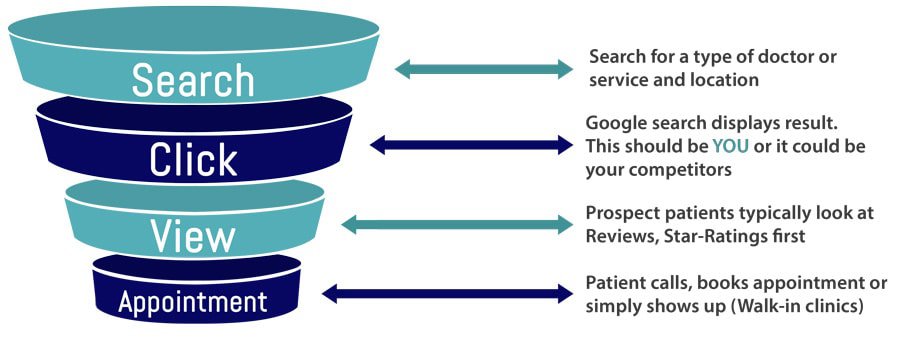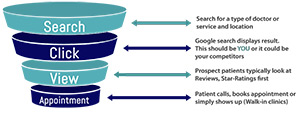What is E-E-A-T Score For Medical SEO & Dental SEO?
E-E-A-T, which stands for Experience, Expertise, Authoritativeness, and Trustworthiness, is a framework that Google uses to evaluate the quality and reliability of websites, particularly those dealing with sensitive topics like health, finances, and safety. In the context of medical websites, E-E-A-T is crucial because it ensures users find accurate, reliable, and trustworthy information, especially when making decisions about their health.
Example of good dental SEO based on E-E-A-T principle. You can see that Google’s Gemini AI is recommending this practice that offers Invisalign in Toledo OH .


E-E-A-T Applies to dental and medical website SEO (Search Engine Optimization). E-E-A-T stands for Experience, Expertise, Authoritativeness, and Trustworthiness. It’s a set of quality guidelines used by Google to assess the credibility and usefulness of content, especially in search results. The concept was originally E-A-T (Expertise, Authoritativeness, Trustworthiness) but Google added the “Experience” component to emphasize the value of first-hand knowledge and real-world experience in content creation. It is a set of guidelines used by Google to evaluate the quality and credibility of content, particularly for medical websites and other Your Money or Your Life (YMYL) pages. YMYL pages, including health-related content, can significantly impact a person’s well-being, so Google holds them to higher standards. E-A-T plays a critical role in how Google assesses content quality and can influence search rankings indirectly through improved content quality and credibility. Medical websites fall under Your Money or Your Life (YMYL) content categories, meaning they can affect a person’s health, safety, and financial stability. Because of the high stakes, Google holds medical websites to the highest E-A-T standards to ensure public safety and prevent misinformation.
E-E-A-T components in SEO
- Experience: The content creator has relevant first-hand experience with the topic. For example, a review of a healthcare that includes personal use of that service.
- Expertise: The content creator has the necessary knowledge or skills on the topic. For instance, a medical article written by a doctor demonstrates expertise. For example if your website page is about Peripheral Artery Disease (PAD) – do you have useful information about the subject matter.
- Authoritativeness: The content creator or the website is recognized as a go-to source for information in its field. This is often built through mentions and links from other reputable sites.
- Trustworthiness: The content is accurate, reliable, and safe. This is the most crucial element, and it’s built by combining the other three components and by showcasing security, clear contact information, and positive reputation. This refers to the fact that is the website can be trusted. How good is the rest of the content on your website. For example if there is doctor’s bio present on a medical website. Are there any other references to this doctor in other media outlets. Are there links pointing back to the bio of the doctor. There are many other factors that determine the trustworthiness.
How do i know if I have good EEAT score?
The first sign is that other companies and websites will start contacting you, if they can link back to your website, and if you can provide a link back to their website. This is also called “link-building”. So if you have quality, non plagiarized content on your website, and it provides:
1) Value to the audience, reader.
2) Search engine can understand your pages and provide a high “quality-score”
You will have high EEAT score, and hence good SEO rankings.


SEO Success for doctors or dental websites requires proficiency in four important areas:
1) Dental or medical industry knowledge and content writing skills
2) Expertise in a) search engine algorithms b) digital best practices and c) patient behavior
3) A dynamic software platform designed to adapt to changes with trends and technology
4) World class support behind your technology system
Achieving top SEO rankings for dental and medical practices is a process and not a simple one-time setup. It is time-intensive, requires deep knowledge about your own medical practice and Search Engine technology, costs both money and time to get real results, and it never stops for your healthcare practice.
Achieving top SEO rankings for medical practices and physicians is a process and not a simple one-time setup.
It is time-intensive, requires deep knowledge about your own medical practice and Search Engine technology, costs both money and time to get real results, and it never stops for your medical practice.
Your target audience is Search Engines and Potential Patients – They are both equally important.
Breakdown of E-E-A-T Factors in Medical SEO:
1. Experience (E) – his refers to the value of first-hand or life experience with a topic. Content from someone who has actually used a product, visited a location, or lived through a specific situation is considered more authentic and useful than content based purely on theoretical knowledge.
2. Expertise (E) – Google prioritizes content from subject matter experts when ranking health-related information to ensure public safety.
- Definition: Expertise refers to the qualifications and knowledge of the content creator, medical or dental website content.
- For Medical Websites: Content should be written or reviewed by medical professionals with verifiable credentials.
- Ways to Demonstrate Expertise:
- Articles authored or reviewed by licensed healthcare professionals (e.g., MD, DO, RN).
- Detailed author bios showcasing professional qualifications.
- Factually accurate and well-researched content.
- Consistent citation of credible medical sources (e.g., CDC, Mayo Clinic)
3. Authoritativeness (A) – A website viewed as a leader in the medical field is more likely to rank higher because it signals reliability and professional standing.
- Definition: Authoritativeness reflects the perceived authority of the website and content creators in their field.
- For Medical Websites: The website must be recognized as a reliable source for medical information.
- Ways to Demonstrate Authoritativeness:
- Featuring professional credentials and affiliations with respected medical organizations.
- Links to and from reputable health websites .
- Positive media mentions and citations in health journals.
- Displaying awards, certifications, and partnerships.
4. Trustworthiness (T) – Trust ensures users feel safe consuming health information and helps prevent the spread of misinformation.
- Definition: Trustworthiness involves the accuracy, transparency, and integrity of the content and the website.
- For Medical Websites: Ensuring accurate health information while maintaining user privacy.
- Ways to Demonstrate Trustworthiness:
- Transparent policies (e.g., privacy policy, HIPAA compliance).
- Accurate, up-to-date health information with citations from reliable sources.
- Displaying contact information and clinic credentials.
- SSL certification for secure browsing.
- Clear disclaimers and content updates by medical professionals.
Key takeaways
Showcase Credentials: Highlight the qualifications and experience of content creators.
Add Author Bios: Include detailed author profiles on blog posts and articles.
Use Credible Sources: Cite peer-reviewed studies and trusted medical organizations.
Ensure Content Accuracy: Regularly update content to reflect current medical standards.
Build High-Quality links: Links to and from high quality websites.
Enhance Website Security: Implement SSL encryption and data protection measures.
Maintain Transparency: Provide clear contact details, disclaimers, and privacy policies.
Is EEAT important for dental practices?
EEAT impacts all search queries, even those involving medical practices. However, it impacts some searches more than others. For subjective searches, like looking at pictures of pretty teeth, there will not be much in the way of objective aspects of that search. If the search returns teeth that are not aesthetically pleasing to the user, it is not a big deal. However, some searches are essential for people to get objective results.
For example, if someone is looking online about what medications can be taken with alcohol and what medications can not, EEAT is very important. If Google returns an untrustworthy article and lacks authority from some random website, that search results can be harmful. That content is likely to be inaccurate or just flat-out wrong. EEAT, when it comes to SEO helps search engines return results that are credible to the search user.
EEAT impacts search and topics in a special category of queries called YMYL or Your Money or Your Life. These searches are on topics that, compared to others, can have a significant impact on a person’s life and future. With that in mind, the results returned to these types of searches must contain accurate information. Some topics in YMYL searches include Safety, Health, Happiness, and Financial Stability. For medical practices, EEAT is vital because many issues and topics on a site fall under YMYL searches.
How is EEAT evaluated?
Every part of EEAT (Expertise, Authoritativeness, and Trustworthiness) are evaluated independently using different criteria. While the concepts are similar, they are not identical and must be tackled separately.
Expertise
The E in EAT stands for expertise. This part of EAT that is evaluated looks at the skill or high level of knowledge on a topic. Search engines will look at a website’s content in this section for the most part, not how it is organized or a website overall. The search engine looks for content written by an expert in the area. With that in mind, those authors with education, qualifications, and formal expertise in the area are given weight. For example, a search engine YMYL topic such as controlling cholesterol will see a doctor specializing in this field have more expertise than a regular blogger. The actual real-life experience and education the doctor has in managing cholesterol will make their content more critical in the eyes of a search engine.
Not all YMYL topics need to have all three tenants of education, qualification, and formal expertise. Some YMYL is based purely on experience. For example, if the topic is “The Best Stretches After A Marathon,” then an author who has run multiple marathons (which does not precisely require education) would have content that would be worth more in the eyes of a search engine. Google considers people like this to be “everyday experts” that may not have formal education but have a lot of experience and therefore are experts on a particular topic.
Authoritativeness
The A in EAT stands for authoritativeness. A search engine will look at the source’s reputation when looking at this aspect. If the source is well regarded among other experts or influencers in the medical industry, its content will be weighed heavier than others. In other words, if someone is a source that other experts and influencers go-to for information, they are considered an authority on the topic. If a source is widely disregarded or deemed wrong, search engine optimization will hold it in less weight.
Authority is generally evaluated by searching for insights and indicators of a website’s reputation or the author of the content. This search will look at experts’ and others’ opinions of the site or content. Some of the things that impact the evaluation of authority include reviews, recommendations, references, other things written by others. SEO will give more weight to independent sources that do not connect to the writer or website.
Trustworthiness
T, the final letter in EAT, is for trustworthiness. Trust is vital in the medical industry and medical SEO. To earn trust in the eyes of SEO, content must be accurate, legitimate, and transparent. Transparency, in this instance, includes making it clear who is responsible for publishing the content. A site that names the author, provides contact information, and lists the author’s credentials is very trustworthy. A website that makes inaccurate claims but does not say who is responsible for that content will be very untrustworthy. Whether the information can be trusted, this aspect of a website is essential for YMYL related searches and all other searches.
Medical websites need to have a high degree of trust because they can dramatically impact people’s lives. With that in mind, SEO needs to see who is responsible for the information on the website and that it is legitimate. A medical practice can boost its trustworthiness in the eyes of SEO by providing contact information and showing who owns or works at a medical practice. The information on a medical practice’s website also needs to be accurate. Outdated or outright false information on a practice’s website will impact its trustworthiness for EAT in SEO.
How can a medical or dental practice improve its EAT in the eyes of SEO?
As the concepts of EAT become more critical and are more easily scored by algorithms used by search engines used to rank sites, there are several ways a medical practice can improve EAT and its SEO. Many of these concepts may be familiar to medical practice, but they take on more importance now than they may have before.
Build More Quality Referral Links To A Medical or Dental Practice’s Website
Links from another website with high authority do a lot to boost the EAT aspects of a medical practice is SEO. Google’s search algorithm, after decades of refinement, does an excellent job at looking at links and seeing if they are quality referral links. Medical practices should try to get high-quality links to their site. If there are too many low-quality links, they will need to start disavowing them, especially from link farms sites.
Keeping A Medical or Dental Practice’s Content Up To Date
Keeping content up to date is critical for a medical practice’s website when considering EAT. Fortunately, if a medical practice has an excellent medical marketing plan, this is covered by content marketing. Content should be revised, updated, and refined regularly. It should be written in a professional style and be of high quality. This will boost the EAT of a site and its overall SEO.
Double Check That Facts Are Accurate
Although it may seem a little obvious, the facts on a medical practice’s website must be accurate. Many medical practices may feel confident that the content they publish is true; however, many forget to go back and check to make sure facts are still valid. Certain ideas or concepts about treatments or conditions can evolve, and what was confirmed a few years ago may now be false. If facts are not checked, there could be incorrect information on a site that will impact EAT and SEO. In reviewing content, as mentioned above, it will benefit a medical practice if they take some extra time to confirm the facts on their site. If there are links to outside sources, this could be an opportunity to update those links with more recent research.
Acquire More Business Reviews
The trustworthiness of a medical practice is impacted by its online reputation. The best way to build an online reputation is to get more reviews for patients. A factor that can hang up a lot of different medical practices is that there are quite a few places out there to leave reviews. For EAT impacting SEO, a medical practice should focus on the big three: Google, Yelp, and Facebook. These are where patients are most likely to leave reviews and potential patients to view them. For a medical practice, they need to make it easy to leave reviews with as few steps or clicks as possible.
Have Experts Write Content For Your Medical or Dental Practice
The content from a medical practice can meet the needs of EAT by having it written by experts in the field. An experienced medical copywriter can create accurate, legitimate, and up-to-date content for a medical practice that will help boost its SEO. With that said, it may not be in the marketing budget to hire an experienced or certified medical copywriter to write everything for a website. However, that does not mean that a practice has to completely give up on this concept. If a copywriter does not have a lot of experience in medical writing, then their content should be reviewed by a doctor working in practice. Have them make notes, edit, and write minor updates to improve the content. While doctors may not have time to write all the content for a website, other staff members may be assigned to it to write the needed updates or additional material.
Post Staff Bios On A Website
Staff bios are an excellent source of SEO material and do wonders to boost the EAT aspects of it. There is no better way to show the authority of a medical practice’s website than posting the bios and credentials of the doctors and other staff members working there. Details in these bios should be where they got their education, conferences they have spoken at, awards they have received, and links to any news articles that feature a quote from them. This kind of content is excellent for EAT and helps SEO. Some owners may worry that this will give a target for competitors to steal away doctors and staff. However, if a staff member is genuinely motivated to look for another job or if a competitor wants to contact someone, there are plenty of different ways and social media channels to do that. The benefits far outweigh the dangers of posting staff bios online.
Post The Contact Information of Your Medical or Dental Practice
A medical practice that does not allow patients or potential patients to contact them will be seen as untrustworthy. Search engines expect to see contact information on a website and other ways to facilitate communication. Some of the things that should be listed on a medical practice include:
- Phone numbers
- Voice Calls
- Faxing
- 2 Way Texting
- Physical Address
- Contact Form
- Social Media Profiles
Do not forget that any method of communication between a practice and a current or potential patient must be HIPAA compliant. Any exchange of data must be made over a secure connection and stored in a HIPAA compliant way so there is no unauthorized access to that data.
Get More Online Mentions
Being mentioned online can come in many forms and several have been covered in a few previous topics. Online mentions could include referral links or positive online reviews, vital for SEO. However, other mentions play a role in positive EAT. These mentions can appear in social media profiles, news articles, reviews, and recommendations. Not all of these mentions will be directly linked to a medical practice’s website, but a search engine will pick up on these mentions, and if there are enough across many websites, it will begin to boost the EAT part of the SEO of a medical practice’ website. This is especially true if these mentions appear on the more well-known website in the medical industry or by experts in the field of medicine.
The experts at PatientGain.com are available to help you create a high-performance healthcare website. We can apply the concepts of EAT to a website to help showcase your medical practice to potential patients. Our experts have helped build the authoritativeness and trustworthiness of many medical practices across the country. Contact us today, and let us show you what we have done for other practices across the country!
